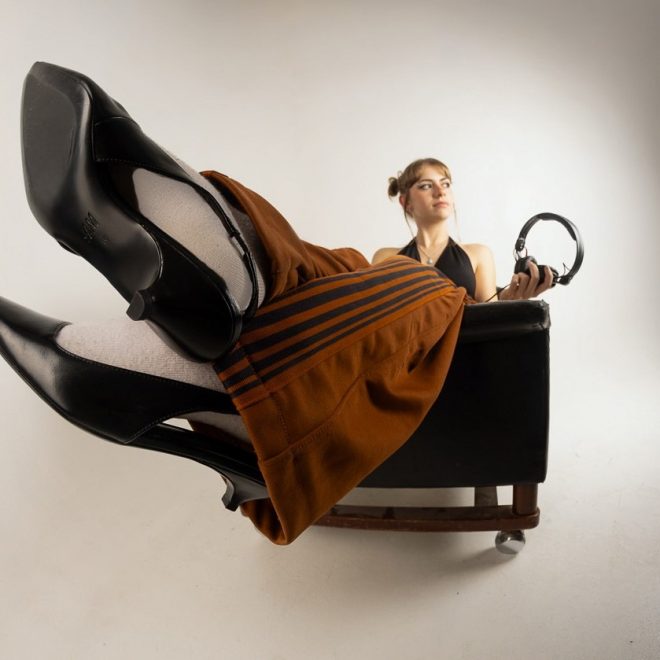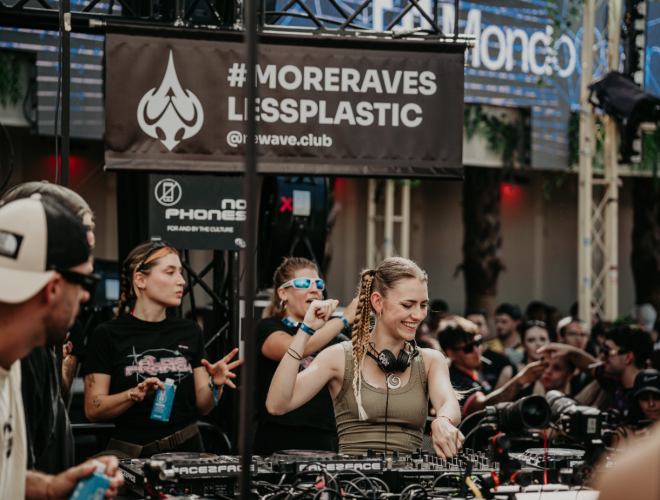Risk, discipline, freedom: the language of Alba Franch

Alba Franch isn’t just another name rising out of Madrid’s electronic underground. She is one of the artists giving shape to the city’s identity, translating its raw energy and chulería into a sound that is both precise and unrestrained. A resident at Mondo Disko, she has carved her place in a booth that has hosted legends, balancing respect for the club’s legacy with her own fearless narrative.
Her background as a classical pianist and art historian gives her a rare perspective: techno, for her, is not only entertainment, but an artistic and cultural language, a structure of tension and release, discipline and freedom. From Madrid to Berlin, her sets reveal an artist who understands dancefloors as spaces of dialogue, where local character meets global exchange.
THE MADRID SCENE AND MONDO DISKO
Madrid’s electronic underground is no longer in the shadows. It has grown into one of Europe’s most dynamic hubs, with collectives, clubs, and crowds shaping its identity night after night. For Alba Franch, the DNA of the city’s techno pulse is found not in theory but in the raw intensity of the dancefloor.
“The DNA of Madrid techno is in the energy that permeates the dance floor. The audience here is one of the most appreciative and powerful I’ve ever met: they dance with incredible intensity and dedication. This connection is so strong that it ultimately sets the course of the session.”
She highlights a distinctly madrileño trait that fuels this culture: chulería. A cocktail of boldness, confidence, and the will to break molds.
“This attitude is reflected both in the DJs, who take risks with their selections, and in the clubs, which dare to program offerings that don’t always follow the unwritten rules of the international scene, but instead respond to what the city wants: enjoyment, surprises, and an intense nightlife. Personally, this Madrid attitude inspires me in the booth: it pushes me to take risks and keep the tension alive between what the audience recognizes and what they don’t expect.”
For Alba, that feedback loop between artist and audience is where the magic lies.
“That energy gives me the freedom to play and build a sonic journey that feeds off the dance floor as much as the dance floor feeds off me. And that’s where I try to contribute my personal perspective, one that’s also nourished by other cities, but always finds its starting point and return in Madrid.”
Nowhere is that energy felt more strongly than at Mondo Disko, the city’s most iconic techno institution. Stepping into its booth is a rite of passage and a responsibility.
“Entering the Mondo Disko booth always commands respect. The club has hosted figures who have shaped the history of techno, and being part of that legacy means living up to a space with a very defined identity. But at the same time, the Mondo dance floor allows you to connect with an audience that fully trusts its offering, which gives me the freedom to take risks and integrate my own musical narrative. When I open the night, I prepare the ground for a meaningful journey with the next artist; when I close, I try to leave an emotional mark and make sure the audience goes home with a huge smile. For me, it’s about a dialogue: keeping the essence of Mondo and its avant-garde spirit alive while contributing my own story through risk-taking. That balance between respect and risk is what makes each session there so special.”
Crossing Borders: From Madrid to Berlin
For Alba, taking her sound beyond Spain has become more than just touring, it is a cultural dialogue. Berlin, in particular, has offered her a contrast that sharpens the edges of her own identity as an artist.
“Traveling and DJing in cities like Berlin has opened me up to a very enriching cultural dialogue. Each scene has its own language: in Berlin, for example, there’s an almost ritualistic respect for the music and the dance floor, while in Madrid, overflowing energy and celebration predominate. Connecting with those audiences means listening, observing, and letting your set be transformed in the exchange.”
Carrying Madrid’s overflowing energy to those stages feels like an act of representation, but each city also leaves a trace on her.
“Exporting Madrid’s energy to those contexts excites me because I feel like I’m carrying a part of the city and its character with me. Conversely, each trip leaves its mark on me. I pay close attention to the work of the DJs and producers I meet in different cities and always try to learn from their technique and character. Often, you can even distinguish a DJ’s nationality by their sound, and I think that’s wonderful. All of that comes back with me and blends into my work in Madrid, creating a constant flow between the local and the global.”
FROM ART HISTORY AND THE CONSERVATORY TO TECHNO
Her artistic language didn’t emerge only from clubs and dancefloors. Alba’s foundation in classical piano and her studies in art history gave her a different set of tools to approach techno, not as pure entertainment, but as an art form with its own architecture.
“I think my studies have influenced my understanding of techno, although not consciously. Both disciplines gave me a sensitivity that allows me to perceive structures, aesthetics, and emotions at all times, whether in sets or productions.”
This doesn’t mean she forces those influences into her sets. They are already embedded in her instincts, shaping the way she perceives sound and form.
“When I’m in the booth or studio, I don’t think, ‘This comes from classical music’ or ‘This comes from visual arts.’ Rather, those influences already live within me and filter through naturally. Techno, for me, isn’t solely entertainment, it’s a cultural and artistic language, a sonic architecture where tension, color, and rhythm coexist to create immersive experiences. The discipline of the conservatory and the perspective of art history gave me the tools to treat techno as something deeper.”
Alba’s roots in classical training taught her structure, precision, and resolution. But stepping into electronic music meant learning how to let go of those rigid frameworks and embrace unpredictability.
“In classical music, everything has a destiny: a piece opens, grows, builds tension, and finally resolves. When I first started producing, I tried to bring that same logic to electronic music, clinging too tightly to the rules of music theory. Instead of helping me, they tied my hands. I realized those rules didn’t have to be a barrier but a tool. Today, I use them in the right measure: they help me create coherence, but I never lose the freedom to experiment. In my sets, I like to maintain a certain narrative, but I’m also drawn to surprise and improvisation, the kind that only emerges in the moment. My creativity is born from that balance: the discipline of my classical background and the freedom I found in electronic music.”

PRODUCTION AS SELF-EXPRESSION
Behind the decks she has already carved out a clear identity, but for Alba, the studio opens a more intimate dimension. It becomes a mirror of her moods and a playground for her imagination.
“My productions inevitably reflect aspects of my life and personality. Some days I’m more nostalgic and the music becomes melancholic; others it takes on a dreamy and ethereal quality; sometimes something simple and fun emerges. It’s a direct reflection of my emotions, but at the same time, production lets me dream beyond the everyday. It’s a bridge between the intimate and the imagined. Right now, I’m very focused on trance, hard house, and hard groove, but that changes constantly. Collaborations also shape my sound. I love working with friends weekly; from those sessions, unexpected sounds emerge, pushing me out of my comfort zone and teaching me something new every time. My current moment is about exploring, learning, and letting emotions and personal connections guide me.”
For Alba, the sound doesn’t exist in isolation. Visuals, concepts, and atmosphere are extensions of her language, not as overthought symbolism but as part of a coherent whole.
“For me, the visual and conceptual aspect is important, but not because I’m searching for deep meaning. What matters is coherence: that the image connects with what the track conveys. These elements give listeners another perspective if they want it, and they form part of my artistic and personal identity.”
LABELS AND LIMITATIONS
Genres help the industry communicate, but they can also put artists inside boxes that rarely reflect their full identity. Alba is aware of this tension, but she refuses to let it dictate her path.
“That tension is always present. Promoters and audiences need clear labels because it makes communication easier. But if I define my project within a single category, I feel limited. My musical identity is constantly evolving, and my authenticity lies in letting it evolve freely.”
Labels may come and go, but her internal compass stays focused on freedom.
“I understand that sometimes I’ll be presented under a specific genre, it’s part of the industry, but internally, I keep working with the freedom of not belonging to just one place. In the end, I prefer people discover me through the experience of my sets and productions, not through a single word trying to define everything.”
In the age of social media, numbers and algorithms often seem to carry more weight than the music itself. Alba navigates this landscape carefully, never losing sight of what matters.
“Social media and algorithms are double-edged swords. On one hand, I love that they connect me with artists worldwide and let me learn from different scenes without leaving the studio. But focusing only on numbers, followers, listens, views risks losing the essence: the music and the joy of creating it. I try to use them with balance: I’m active, but always to showcase my productions, sets, and projects. I prefer my online presence to revolve around my art, not the algorithm’s game.”
LEGACY AND ESSENCE
What does Alba want people to carry with them after a night on her dancefloor? The answer is not abstract theory or intellectual decoding, but something deeply human.
“What matters most to me is that people listen to my music or leave the club with a feeling of fulfillment, happiness, even peace. That they feel like they gave their all on the dance floor and truly enjoyed the journey. For me, there’s nothing more valuable than that. The story behind a set or track doesn’t need to be analyzed or understood by everyone, I’m not searching for hidden meaning. All I want is for the music to act as a channel of enjoyment, dedication, and celebration. If the audience leaves with that energy, then I’m satisfied with my work.”
Watching Alba navigate Mondo Disko or Berlin, you realize she doesn’t need fireworks to command attention. Her strength lies in the way she reads a dance floor, in how she creates space for surprise, and in her refusal to compromise on authenticity. Alba plays as if every set is both a risk and a gift, a moment that belongs to her but also to everyone dancing with her.
That is perhaps her most important contribution. She reminds us that techno is not about labels or algorithms, it’s about people, about the feeling you take with you when the lights come up. Alba leaves you with that quiet conviction that the music is bigger than the night, bigger than the tracklist. And in an industry so often obsessed with the surface, she is proof that depth still matters.


